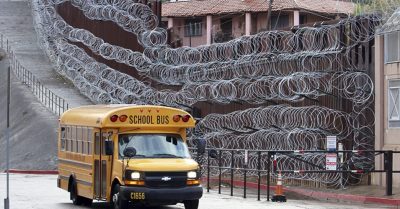Border Town in Arizona to Trump: Tear Down This Wall… of ‘Inhuman’ Razor Wire

The unanimously approved resolution characterized the installation of the razor wire, recently installed by U.S. Army personnel, as “not only irresponsible but inhuman.”
***
It was, in a way, Reaganesque.
On Wednesday night, the city council of Nogales—an Arizona border town with a population of 20,000 people—unanimously passed a resolution calling for the Trump administration to remove razor wire that covers in near entirety a border wall that passes through its downtown.
The resolution characterized the installation of the razor wire, recently installed by U.S. Army personnel, as “not only irresponsible but inhuman.”
Arizona city officials want troop-installed razor wire removed from border wall https://t.co/0oWhPRx3of pic.twitter.com/p7eOCcyDJ8
— Military Times (@MilitaryTimes) February 7, 2019
The resolution—which says such a wall “is only found in a war, prison or battle setting” and has no place in the city—says that if the government does not remove the wire, it will file a lawsuit to have it taken down.
As Tuscon.com notes,
“The council’s action came one day after President Donald Trump made his case to the American people about the need for a border wall and how he has ordered 3,750 troops to prepare for what he called a ‘tremendous onslaught.'”
To some critical observers, however, it was unclear if the razor wire was intended to keep refugees and migrants out, or keep U.S. residents in:
As you can see, the braintrust that is Trump’s coterie of dumbalinas came up with the genius idea of putting up razor-wire…
…on the U.S. side of the wall.
If you’re planning on fleeing the country on foot, I’d suggest avoiding Nogales. They’ve really fenced you in.
— The Hoarse Whisperer (@HoarseWisperer) February 7, 2019
Earlier in the week, Mayor Arturo Garino told the local Nogales International that the razor wire was “lethal” to the town’s residents. “I really don’t know what they’re thinking by putting it all the way down to the ground,” he said.
*
This work is licensed under a Creative Commons Attribution-Share Alike 3.0 License
Note to readers: please click the share buttons below. Forward this article to your email lists. Crosspost on your blog site, internet forums. etc.
Featured image: In this Monday, Feb. 4, 2019 photo, a school bus rolls past the razor wire-covered fence at East International and Nelson Streets in downtown Nogales, Ariz. (Photo: Jonathan Clark/Nogales International via AP)

